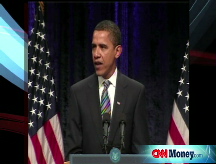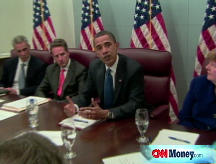Mortgage help gains momentum
Hundreds of billions will be spent to spur the economy. The elephant in the room - foreclosure prevention - hasn't gotten much notice. That is changing.
NEW YORK (CNNMoney.com) -- There are many ways to spend $800 billion to revive the economy. In recent days, President-elect Barack Obama has ticked off many of them: invest in infrastructure projects, help states pay for Medicaid, cut taxes on the middle class, expand use of renewable energy.
But what about helping those at risk of foreclosure, and by extension the housing market as a whole?
Lawmakers in Washington are demanding that more be done, and they are aiming their sights both at the $700 billion financial rescue package known as TARP and the massive economic stimulus bill Obama is pushing as vehicles for new housing measures.
Already, Treasury Secretary nominee Timothy Geithner is working on plans to revamp the way TARP is used to make foreclosure prevention a bigger priority, two transition aides told CNN. Congress has made it known that it likely won't release any more TARP funds until some of the money is earmarked for housing.
For his part, Obama has been shy on details but has said that within a month or two he would unveil "a sweeping effort to address the foreclosure crisis so that we can keep responsible families in their homes."
Meanwhile, Senate Budget Chairman Kent Conrad, D-N.D., on Wednesday said it would be a mistake to pass a stimulus bill without also tackling the housing crisis.
"The housing market is 16% of the economy," Conrad said. "To think that we are going to have a package of economic recovery that does not address housing adequately I think would miss the boat."
Use TARP for homeowners: House Financial Services Chairman Barney Frank, D-Mass., is writing a bill that would impose conditions on the use of any more TARP money and in a memo to colleagues this week called for "substantial efforts" to be made to reduce foreclosures, a spokesman for Frank's office said in an e-mail.
Frank said Friday that his bill will call for $40 billion or $50 billion from TARP funds to be used for foreclosure mitigation. And he's calling on the Treasury to implement a plan by April 1.
That plan essentially must be a version of a plan proposed by FDIC Chairwoman Sheila Bair. Bair's plan would systematically modify loans and provide a government guarantee to protect investors in the event a homeowner re-defaults after the loan has been modified.
The plan also must reduce the costs and writedown requirements for lenders and borrowers of the Hope for Homeowners program, which began in October but has helped virtually no one.
That program offers full government backing for lenders that agree to write down a mortgage to below a home's appraised value. But the loss to lenders can be greater than that reduction because many troubled homeowners are also "under water" due to falling home prices - meaning they owe more on their home than its current market value. So as the law was initially passed, to participate in Hope for Homeowners, lenders in many cases would have to lock in a sizeable loss.
"We wrote it too restrictively. ... [Now] we'll make it more user-friendly," Frank told reporters on Friday.
Reform bankruptcy law: On Thursday, Senate Banking Chairman Christopher Dodd, D-Conn., and Sen. Richard Durbin, D-Ill., said that Citigroup (C, Fortune 500) has agreed to support a proposal that the lending industry has strongly opposed that would allow bankruptcy judges to write down the primary mortgages of homeowners filing for bankruptcy.
The bank's support of the proposal is based on the condition that the change only apply to existing mortgages and that homeowners filing for bankruptcy notify their lenders 10 days before to give them a chance to modify the mortgage.
Other lenders and housing industry interests -- including the powerful National Association of Home Builders -- have also started to lower their resistance to so-called bankruptcy cramdowns.
The long-held argument against cramdowns is that they would cause rates to rise because mortgage securities investors would demand a higher interest rate to compensate for the risk that a judge could rewrite mortgage contracts on terms disadvantageous to the investor.
Offer bigger tax break to home buyers: NAHB has been pushing for all home buyers to get a temporary tax credit for buying a primary residence worth up to 10% of the purchase price. A tax credit is a dollar-for-dollar reduction of one's tax liability.
Currently, only first-time buyers may get a temporary tax credit worth up to $7,500 for a limited period of time. But that credit functions more as an interest-free loan from Uncle Sam because the home buyer has to repay it over time.
Neither Dodd nor Senate Finance member Charles Schumer, D-N.Y., speaking to the press on Thursday, endorsed the idea of an actual tax credit. Dodd said a tax credit would not help prevent foreclosures but could spur economic growth.
And Schumer said there was "broad support" among members of the Senate Finance Committee to make tax policy changes to support housing, particularly existing homes as opposed to newly constructed ones.
Push interest rates down: The National Association of Realtors, among others, has pushed for the Treasury Department to take a more active role in driving mortgage rates down by buying securities backed by 30-year fixed-rate mortgages from Fannie Mae and Freddie Mac.
Frank has suggested that in order to use TARP funds, Treasury must commit to using some money to "stimulate demand for home purchases ... including through ensuring the availability of affordable mortgage rates for qualified home buyers."
A plan already in place at the Federal Reserve has already had the effect of lowering rates on the 30-year fixed to record lows. The Fed is buying up to $500 billion in mortgage-backed securities backed by Fannie and Freddie, a move that bolstered confidence in the mortgage giants' ability to continue to buy and back loans in the secondary market.
Another idea that has been floated recently is to have Uncle Sam use money to buy down points on home buyers' mortgages to lower interest rates.
CNN's Jessica Yellin contributed to this report. ![]()




